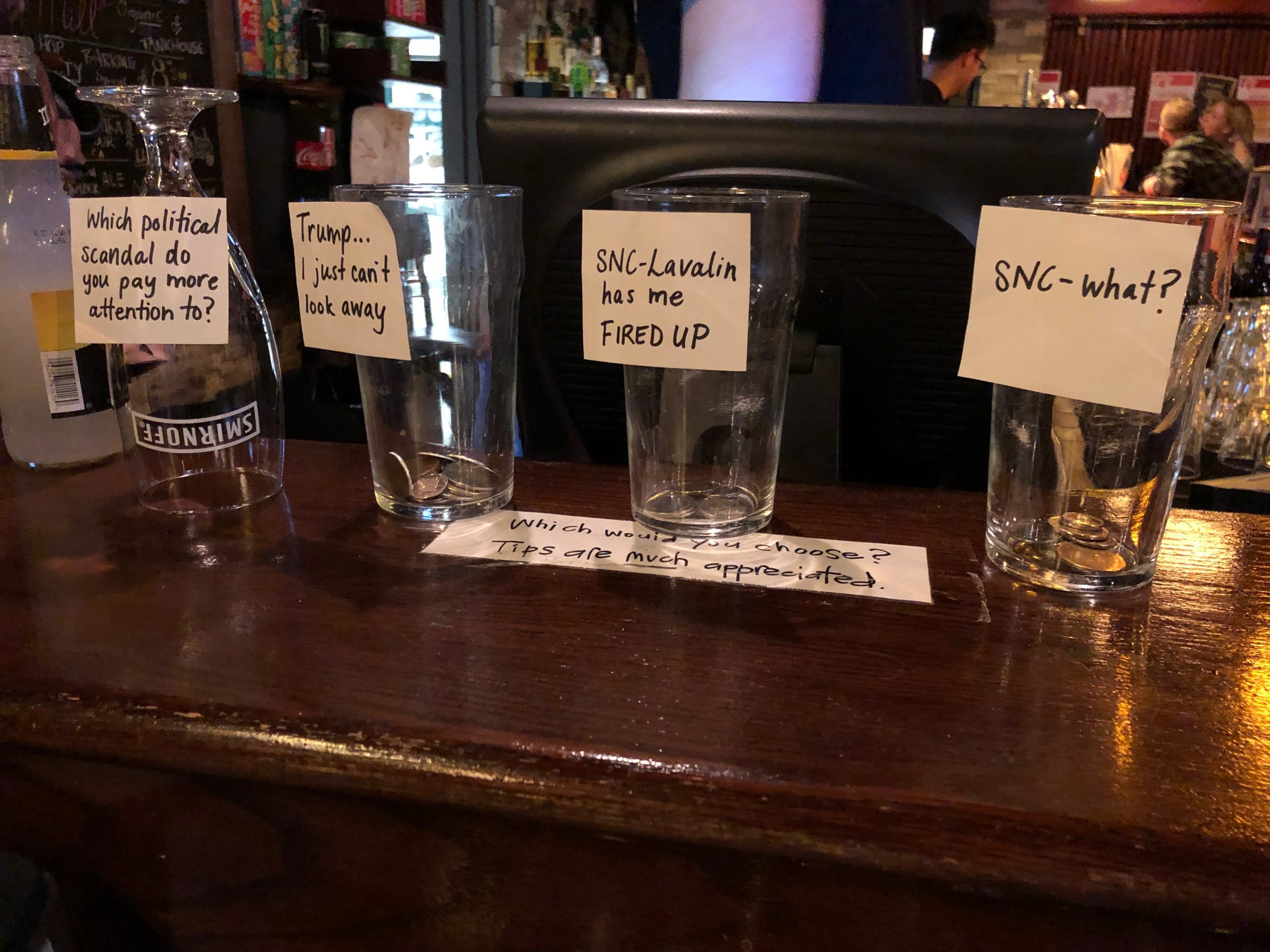With the birth of the 24-hour news cycle came the beginning of the never-ending need to know everything right away. Now, on top of that, we have social media putting pressure on us to keep up with the lastest news and a technology addiction that keeps us connected at all times. It’s exhausting.
“Anyone else struggling with work/life/political scandal balance?” Amy Kishek asked her Twitter followers on March 4. The Ottawa-based lawyer and occasional Beaverton satirist immediately racked up responses from fellow Canadians claiming they couldn’t concentrate on anything other the SNC-Lavalin affair. Comment after comment added complaints to the thread about news cycle exhaustion and needing a vacation from Canadian politics. One user simply responded with a Gif of a crying Britney Spears. Enough said.
It’s been about three months since the Globe and Mail reported that Trudeau’s aides unsuccessfully tried to press then-attorney general Jody Wilson-Raybould to intervene in the fraud charges laid against Montreal-based firm SNC-Lavalin. Since then, the Canadian mediascape has been a whirlwind of rumours, reports, reshuffling, and resignations.
News fatigue has been a major issue in the U.S. for the past couple of years, especially during the Trump era. According to a 2018 Pew Research study, nearly 70 percent of Americans reported feeling fatigued by the amount of news available. However, it’s a relatively new concept for Canada. The SNC-Lavalin scandal gave Canadians a taste of what it’s like to be consumed by news every minute of the day. Not to mention the scandal has been unfolding alongside other huge news stories like the Mueller report, Doug Ford’s cuts, and Michael Cohen’s testimonies, resulting in a mediascape that’s so overcrowded it feels almost impossible to stay informed. Needless to say, if you‘re feeling exhausted by the news, you’re not alone.


As a co-host of the Bad + Bitchy podcast, Kishek says the busy news cycle ensures there’s no shortage of talking points, but she also says it’s paralyzing to be confronted with so much news of equal importance. “I think what makes it overwhelming is the work that follows,” she explains. “As activists, workers, and engaged citizens I think a lot of people feel our energies are very divided.”
For Kishek, it’s not just a personal pressure to keep up. Being a young lawyer, she’s expected to have an online presence and be well-versed in current events. Most of that voice comes out on Twitter, where Kishek openly expresses opinions and questions about Canadian politics. However, social media can be tricky in the work/life balance. “It does seep into other areas of your life,” she says. “It’s a lot harder to draw boundaries these days.”
Anna Desmarais, CFRA Ottawa producer and on-air contributor, attributes part of the growing news exhaustion problem to the 24-hour news cycle. Working at a 24-hour radio station, Desmarais is always thinking about how stories are developing, even in her downtime. She says the amount she thinks about the news hasn’t necessarily changed but the pressure to stay updated has increased. “You would log off twitter to go have dinner with a friend or go for drinks or play a sport and you’d go back to Twitter and the whole landscape had changed,” she says.
The addition of social media into the 24-hour news cycle has made it so that the news never stops. If you aren’t constantly tuned in, you’ll fall behind. It’s easier than ever for a political staffer to call up a journalist and leak a story. “Even if the news hour at 6 o’clock is over, there’s still room to break news at seven or 8 o’clock at night when people are busy doing things and living their lives,” Desmarais explains.
There are some days where my phone buzzes literally every 30 seconds: and this doesn’t even count the dozens of phone calls you field everyday from sources and PR pros. #cdnmedia https://t.co/CFxtITpMbG
— Anna Desmarais (@anna_desmarais) May 13, 2019
Social media has its pros and cons when it comes to news. It allows the public to watch what’s happening in real-time but it also makes people tired of seeing the same story again and again. “Every news outlet is covering it, so it dominates social media feeds and it leads people to more fatigue, not only with the news cycle but with our democracy and political system in general,” says Desmarais.
Kishek actually gets most of her news through people she follows on Twitter, “whether it’s journalists or decision makers, folks who are either making the news or writing the news in real-time,” Kishek says. She’s getting her news as it’s happening, something only social media can offer.
Like Kishek, Kate Harrison is a working millennial in Ottawa and trying to stay on top of the news. But unlike Kishek, her Twitter dependence is relatively new. “I’m basically up at 5 a.m. checking Twitter to see what I’ve missed and I put my phone down at 10 at night,” she says. She started following more journalists from the press gallery and has Twitter open on her desktop constantly because every time she checks back in there’s a new development that requires her time and attention.
Harrison responded to Kishek’s Twitter query about work/life/scandal balance with a Gif of Hilary Duff raising her hand with the words “this girl” across the bottom. Harrison is the Vice President of the government relations firm Summa Strategies, Chair of the Canadian Advocacy Network, and occasional political commentator for radio and television. “It’s been a bit overwhelming to keep up with everything that’s happening and then actually go about your everyday course of business,” she says.
Her position as a commentator and a government relations specialist puts her in a unique situation where she has to stay up-to-date both to talk about it on air and also be able to give her clients advice as it relates to the story’s development.
For political junkies like Harrison, the massive amount of scandal coverage is daunting because there are so many different angles. “You almost feel the need to know all of it,” she says. Part of Harrison’s job is to stay informed on politics, but she says she could see how the amount of time and energy spent on the SNC-Lavalin affair in the media can be frustrating for average news consumers.
She points out how news exhaustion pushes people to gravitate towards familiar news sources. “There’s so much out there that we’re seeing a tendency to really curated news experiences,” she explains. “People are busy and they make a conscientious decision about who they trust in terms of where they get their information.”
Desmarais, on the other hand, has different worries when it comes to exhaustion. In terms of her audience, she says reading the same story over and over makes us less likely to engage with it critically. But as much as the public is fatigued reading about the scandal, Desmarais says journalist are fatigued talking about it. And it’s not just big scandals that cause news exhaustion for journalists, it’s the everyday stress of following the cycle. Desmarais found there’s not a lot of support in the industry for reporters who are feeling burnt out and might need a mental health day. “That’s something journalists and newsrooms, in general, are going to have to look at in the future,” she says.
When the scandal first broke, the media wanted to cover it and the public wanted to hear about it. “It was the perfect storm of need to know and want to know,” she says. But as it dragged on, Desmarais says journalists were getting skeptical about whether they should still run these stories. For a while they continued pumping out the scandal content, but as soon as the public expressed their boredom they pulled back on coverage. Unfortunately, it’s hard to keep reporting on the issue when the audience is fed up but there’s still a lot left of this story.
One way to fight news exhaustion is to engage with reputable news sources instead of getting caught up in the social media storm and falling into the trap of the infamous “fake news.” It can be helpful to disengage for a couple of hours or even a couple of days, but permanent disengagement is a dangerous solution to news exhaustion. The Trump administration deliberately tries to confuse the media to distract them from other issues. It’s the news consumer’s job to fight back by staying informed in a way that doesn’t overload their mental and emotional capacities.
It’s fine to take a break, according to Kishek, but “the trick is for people not to be disillusioned or become inactive or paralyzed by the news.” It’s about taking that fatigue and using it to fuel conversations, taking that frustration and channelling it into collective actions.








